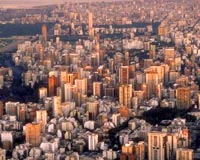| . |  |
. |
Beijing (AFP) Jan 17, 2010 China is expected to raise interest rates and let its currency appreciate in the coming months as policy-makers resort to more aggressive measures to prevent the economy overheating, analysts said. Moves by the central bank in the past two weeks to rein in a surge in bank lending signalled a policy shift that would help the world's third-largest economy avoid Japan's boom-bust experience of the late 1980s, they said. "I believe we are at the beginning of a new phase of policy tightening -- we will see more tightening coming in the next few months," Peng Wensheng, head of China research at Barclays Capital in Hong Kong, told AFP. After repeated calls for banks to moderate their lending activity, the People's Bank of China took action last week, hiking the minimum amount of money that banks must keep in reserve for the first time in more than a year. It has also in recent days raised interest rates on one-year and three-month treasury bills in a bid to curb record lending. The fiscal tightening moves caught analysts by surprise and came after state media reported banks had extended a massive 600 billion yuan (88 billion dollars) in loans in the first week of January. That amount was not far off the combined 674.6 billion yuan in new loans given out in November and December. New loans in China nearly doubled in 2009 from a year previously to 9.59 trillion yuan, government data showed. The central bank did not give a reason for its moves but analysts said they showed the government wanted to rein in a credit expansion that has led to concerns over inflation, asset bubbles, bad loans and economic overheating. "Growth was last year's problem -- it is dealing with the consequences of growth and the policies that China successfully reflated the economy with that are the issues for 2010," Eric Fishwick, a Hong Kong-based economist at CLSA Asia Pacific, told AFP. "China no longer needs to have a hyper-stimulatory policy -- I would argue that it no longer needs a stimulatory policy, period." In addition to more bank reserve ratio hikes, Beijing is expected to raise interest rates and allow the currency -- effectively pegged to the US dollar since mid-2008 -- to appreciate in the coming months, analysts said. "As we have argued for several months now, higher benchmark lending rates and a stronger yuan will need to be part of the package," said Brian Jackson, a Hong Kong-based senior strategist at the Royal Bank of Canada. "We continue to believe that an initial move around the end of the first quarter is likely." Calyon Credit Agricole agreed, saying in a note that policy-makers appeared to have reached "a consensus... on the pace of the monetary tightening and this may open the door to move on the currency sooner rather than later." In the past year China adopted what it called a "moderately loose" monetary policy and embarked on an unprecedented four-trillion-yuan (586-billion-dollar) spending spree to keep the economy growing amid the global downturn. It also urged banks to pump up lending, but after the amount of new loans subsequently surged, the government in recent months reversed course and called for "reasonable" lending as inflation fears rose. The consumer price index, a key gauge of inflation, rose in November after an almost year-long bout of deflation. "I've never seen a government stimulate an economy as aggressively as China has done, which means the need for reduction is more than anywhere else," said Fishwick. "Preemptive policies stand the best chance of working." Last year's stimulus measures have borne fruit. China grew 8.9 percent in the third quarter -- the fastest pace in a year -- after expanding by 7.9 percent in the second quarter and 6.1 percent in the first three months. Economic data due to be released this week are expected to show the economy grew by 8.5 percent in 2009. China's strong growth and soaring asset prices have led to comparisons with Japan in the 1980s -- but analysts said Beijing's swift action to contain inflation and cool the property market would help it avoid the boom-bust experience of its Asian neighbour. "I think the chances of China repeating what happened in Japan is not impossible but it is unlikely," Pu Yonghao, head of Asian economic and investment strategy at UBS, told AFP. "China is taking action to prevent such an asset bubble." Peng said Chinese policy-makers were trying to "strike a balance" between controlling inflationary pressure and maintaining economic growth. "They will tighten policy in a phased manner," he said. "They do not want to threaten the sustainability of the recovery."
Share This Article With Planet Earth
Related Links The Economy
 Argentina Central Bank crisis hits new low
Argentina Central Bank crisis hits new lowBuenos Aires (UPI) Jan 15, 2009 Argentina's Central Bank remains at the center of a worsening row between President Cristina Fernandez de Kirchner and the bank governor and now threatens to engulf Congress and the courts. The government raised the stakes by going to litigation in defense of its decision to dismiss Central Bank Governor Martin Redrado, who opposes the use of $6.5 billion of bank reserves to pay the nat ... read more |
|
| The content herein, unless otherwise known to be public domain, are Copyright 1995-2009 - SpaceDaily. AFP and UPI Wire Stories are copyright Agence France-Presse and United Press International. ESA Portal Reports are copyright European Space Agency. All NASA sourced material is public domain. Additional copyrights may apply in whole or part to other bona fide parties. Advertising does not imply endorsement,agreement or approval of any opinions, statements or information provided by SpaceDaily on any Web page published or hosted by SpaceDaily. Privacy Statement |